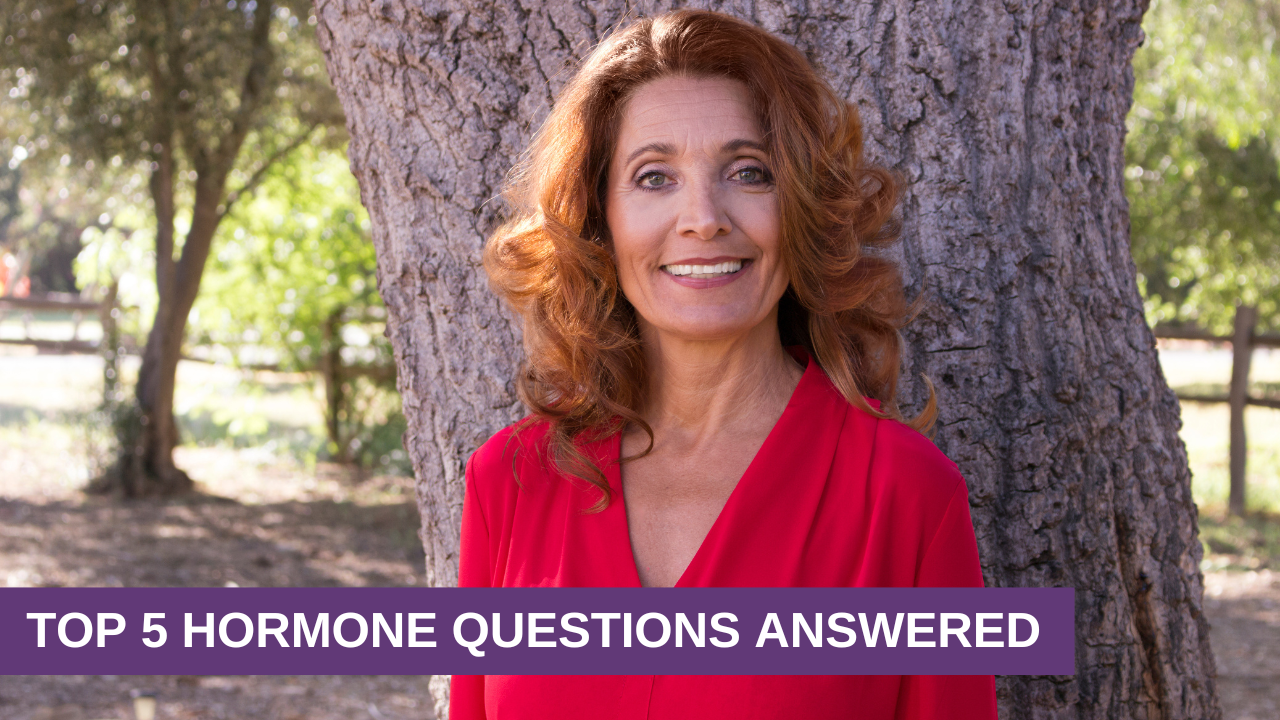Today, I am going to answer your biggest hormone questions. Everything from stubborn weight gain to crazy sleep patterns, feeling exhausted all the time, even when your labs are normal.
I want you to know that I’m taking questions from YouTube, Instagram, my Substack, and in my Hormone Support Group.
Any questions that you’re posting, I’ll try to answer in future episodes, but we already have some questions today, so let’s get started.
Question #1: Why am I so tired all the time if my labs are normal?
Wow. I get this question all the time. Patients come to me and say, you know, I’m having all these symptoms. I’m fatigued all the time, and my doctor says everything’s fine in my blood work. Well, first, your blood work doesn’t really show the deep dive of hypothalamic pituitary, lower endocrine gland communication.
Blood work doesn’t reveal what’s going on at your tissue levels. Actually, your history, your physical exam, what you’re telling me, and symptoms are a much better indication of what’s going on with your hormones. If you’re fatigued all the time and all your doctor’s looking at is, let’s say your TSH, and not getting free T3 and free T4, there’s no indication of what’s going on at the hypothalamic pituitary thyroid axis.
So your TSH may be low, normal levels, and your T4 and T3 may also be low normal levels, but that’s miscommunication of the HPT access, and it’s probably not normal for you. We need to look a little deeper and look with different eyes at the blood work in order to really see what’s going on with the hypothalamus.
So what I find that really helps keep my hormones in balance and keeps my patients’ hormones in balance is supporting their hypothalamus nutraceutically with Genesis Gold®. It really helps to increase their energy, improves receptor site function, so the hormones they’re making are actually getting into their cells. And by improving that receptor site function, it actually improves the communication between the hypothalamus, the pituitary gland, and the lower endocrine gland like the ovaries, testes, adrenals, and thyroid.
Which is super important to staying energized and feeling in balance.
Question #2: How do I know if my hormones are imbalanced?
Well, that is a very good question!
I mean, we often just assume everything’s functioning fine, and we don’t realize that our hormones are out of balance. But if you’re having mood swings, you’re anxious all the time, you’re irritable, you go into a rage, you’re depressed, or if it seems like your PMS symptoms are heightened.
Or you’re not sleeping well, you can’t either fall asleep or stay asleep. You’re having trouble with weight gain, or you’re having trouble losing weight in spite of dieting and exercising. If your menstrual cycles are becoming irregular, if you’re noticing that you’re having changes in your skin, maybe rashes or oily skin, dry skin, or acne.
Even if your gut feels like it’s out of balance with constipation, diarrhea, or bloating. If you’re fatigued, especially if you wake up tired or you crash in the afternoon, these are all signs that your hormones are out of balance. It’s important to check in with your body and watch your patterns. What has been your normal pattern, and how have you strayed from that?
Hormonal Imbalance?
Most people don’t start off sick, but you could have been living with hormonal imbalance for so long that you didn’t realize that your pattern isn’t normal. So you need to look at how your energy is during the day. A healthy hormonal balance means you wake up with energy. You are hungry in the morning, you’re ready to start your day.
When you go to sleep, you fall right to sleep. And you stay asleep. You have energy throughout the entire day. It’s normal for all of us to feel a little bit lower energy between three and five when our adrenals produce a little less cortisol, but usually our energy levels peak back up again, and that’s a good time to take a walk and move.
In my Hormone Reboot Training, I go into detail about how your hormones work in all your different body systems, and what are the signs and symptoms of hormonal imbalance.
Question #3: What should I eat to balance my hormones naturally?
That’s a great question, because what you eat becomes who you are.
Those molecules, those nutrients, are becoming you. So, feeding your body with highly nutritious food means everything’s going to function normally. My favorite diet, and it’s not just because I’m Italian and I’m married to a Greek, is the Mediterranean diet. It’s plant-based, fairly easy to follow, includes lots of fruits and vegetables, whole grains, legumes, nuts, and seeds.
The fats are usually monounsaturated fats that make up most of the dietary fat, usually olive oil, but it could be avocado oil. It provides an adequate amount of protein from legumes, fish, poultry, nuts, and seeds. It includes very little red meat, very little processed foods, and you can still have a little coffee, tea, and a little bit of red wine.
Everything’s in moderation. It’s not super strict, but it’s easy to follow.
You want to make sure that you’re getting enough fiber, and you get those from plant foods like whole grains, vegetables, and legumes. And you want to make sure that your blood sugar’s in balance. And the best way to do that is every time you eat, you really need to make sure that you’re eating a little bit of protein, a little fat, and a little complex carbohydrate.
Support Your Hypothalamus
Eating this way really helps to support your hypothalamus because it gives your hypothalamus the nutrients it needs. Consume all the colors, deep, dark greens, cruciferous vegetables, bright, colorful berries, blues, reds, purples, citrus fruits, orange squashes for extra betacarotene. Really making sure that you’re eating a colorful diet ensures that you’ll get all the phytonutrients that your hypothalamus needs to keep your hormones in balance.
And the fiber in the plant-based diet helps to keep your gut microbiome healthy, which helps you detox your hormones.
Question #4: Can hormonal imbalance cause anxiety or depression?
Absolutely! Especially premenstrually, during perimenopause, in the onset of menopause, and in the postpartum period. That’s what postpartum depression is.
You start off with super high hormones of pregnancy, and all of a sudden, it bottoms out. About nine days after you’ve given birth, your brain chemistry is washed out of estrogen and progesterone. If you’re breastfeeding, you’re making lots of prolactin, which is blocking steroid hormone from getting into the cells.
You need estrogen to make serotonin. You need progesterone to make calming GABA. Testosterone is needed to make dopamine. If you’re under a lot of stress, you produce too much cortisol, which is constantly activating neurotransmitters, which makes you feel anxious all the time.
You’re not producing enough progesterone, your periods are irregular. You’ve been under a lot of stress, and you’re utilizing all of your progesterone to produce cortisol. You’re not going to produce enough GABA, which has that calming effect on the brain chemistry. If you’re not making enough estrogen, you’re not going to produce enough serotonin, which helps to prevent depression.
Your neurotransmitters are intimately connected to your hormones. You need healthy thyroid hormone, specifically T3 in your brain, for your neurotransmitters to function properly.
Let’s go for a fifth bonus question here. Someone asked me…
Question #5: What’s one thing I do every day for my hormones?
Every day, I take my Genesis Gold® to support the maestro of all my hormones, the hypothalamus. Taking Genesis Gold® every day helps to keep my hormones in balance. I’ve been taking it for over 20 years, and it helped me stave off menopause for 10 years later than any of my sisters.
It’s kept my thyroid and adrenal glands functioning well. It’s helped my penial and pituitary glands stay healthy. Genesis Gold® has kept my gut healthy, particularly my microbiome. Taking Genesis Gold® regularly has slowed down the aging process, keeps my brain functioning normally, and helps keep my hormones in balance.
I love answering your questions, and it helps us all learn together!
So if you have a question you want me to answer in the next Q&A, drop it in the comments, or you can direct message me on Instagram.
If this video’s been helpful, please like it, comment, and subscribe. Plus, you could share it with a friend! Please join us in our free Hormone Reboot Training and learn more about Genesis Gold® here.




0 Comments